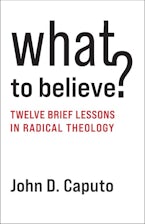- Home
- philosophy
- religion
- literary criticism
- The Mask of Memnon

The Mask of Memnon
Meaning and the Novel
110 Pages
- Paperback
- ISBN: 9781666719505
- Published By: Wipf & Stock Publishers
- Published: March 2022
$17.00
One of the greatest struggles of an author, especially a philosophical author, is finding their own voice. Too often writers are wont to follow in the steps of their idols. For Jean-Luc Beauchard, author of The Mask of Memnon: Meaning and the Novel, those idols would be Plato, Friedrich Nietzsche, Søren Kierkegaard, and Albert Camus. In this latest work, Beauchard distinguishes himself from these authors and creates something unakin to those before him.
Memnon presents itself as many things: literary theory, philosophy, theology, literary analysis; however, it eludes all of these classifications, remaining perpetually elusive. The reason for this is that, as Beauchard begins (and ends) his book by telling us, this work is first and foremost a failed novel (xi, 93) and we ought to read it as such.
The plot of Beauchard’s would-be novel begins with its protagonist learning of his fate as a character in a novel and meeting Beauchard, his author (1-4). Without actually reading Beauchard’s book, this set up sounds trite: Why would someone begin his book of literary theory this way? In fact, the whole endeavor almost feels meaningless until you realize who Beauchard makes the protagonist of this seemingly failed novel. “Imagine,” he asks of us, “that you are a character in a novel” (5), and then on the next page further urges us to “imagine that you are my character in my novel” (6, my italics). This shift, whereby the reader becomes the character, is necessary for understanding the purpose of this book.
To see what is meant by this shift from reader to character we must examine what Beauchard is attempting with his book, for it is only through this understanding that we can adequately judge if Beauchard accomplished what he set out to do. The main problem Beauchard finds with meaning in novels is that it is elusive and ungrounded for its characters. There are two ways, Beauchard writes, that a character can find and derive meaning from their existence: the first is through the author and the second is through the self (6). The remainder of this first and the next three chapters go on to defend and then rebuke both possibilities, ultimately arguing that these derivations of meaning are in fact meaningless. Meaning for the character that is derived from the author finds itself lacking because “the author who imposes his meaning imposes it not for the sake of his characters . . . no, his meaning is meant for his audience, for the reader” (13). This meaning is meaningless because it has nothing to do with the one who lives it but is intended only for the observer. The natural response to this meaninglessness, as Beauchard points out, would be the existentialist way of thinking: the character “must ground his own existence, create his own values, define himself, determine the why, the to what end of his being” (16). However, despite this rebellion against the absurd, because one is not the author of their own story “meaninglessness persists all the same. And the character who asserts himself only continues his long descent into the abyss” (26).
Then there is a break in the book. Beauchard pauses in the suspense of his discussion of meaning and meaninglessness to entertain us with a number of aphorisms. Insights such as “It is painful to realize your reader has found in your work not what you wrote but what he expected to find” (33) and “‘Don’t judge a book by its cover,’ says the man who knows nothing of books—or covers” (36). It is a solace, then, that Memnon at least has a very good cover.
The book ends with a reading of The Brothers Karamazov. It is not an analysis of The Brothers Karamazov, however. Instead, Beauchard uses the novel, through the five Karamazovs (including Smerdyakov), as a medium to reiterate and reinforce his philosophy of meaning and meaninglessness, with the father and each brother representing a different approach to sin, despair, and the absurd (50-51). It is in this half of the book that Beauchard becomes a true academic. He masterfully weaves his philosophy into Dostoevsky’s novel in order to conceptualize his philosophy in praxis.
This book is presented as a philosophy of literary theory. However, by constantly referring to us as characters, Beauchard is subtly making the point that his philosophy moves beyond the novel and applies to our lives as well (notice how the subtitle of the book is “Meaning and the Novel” as opposed to “Meaning in the Novel”). By making us characters, Beauchard underscores the idea that these problems of meaning and meaninglessness extend beyond the page and apply to us as well, for we are but characters on the stage of life (97). And it is because of this shift from literary theory to philosophy of life that makes Beauchard’s book successful.
Memnon is the type of book academics won’t read because it is too novelistic, and novelists won’t read because it is too academic. The Mask of Memnon is less about quelling your fears of meaning and meaninglessness and more about making you aware of them. For to accept or deny this meaninglessness is, as Beauchard says, sin, but so is to be ignorant of it(24). In this way Beauchard could be seen as a torchbearer, illuminating the darkness of meaninglessness only to reveal, and seemingly revel in, the darker meaninglessness that surrounds this ignorance, leading us out of sin into sin.
L.M. Rising is an independent scholar.
Lucy RisingDate Of Review:February 19, 2023
Jean-Luc Beauchard is a philosopher of religion. He has taught courses in philosophy, theology, and literature at multiple colleges and universities in New England.











